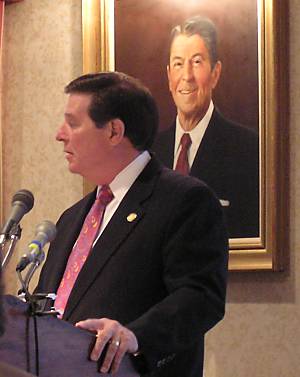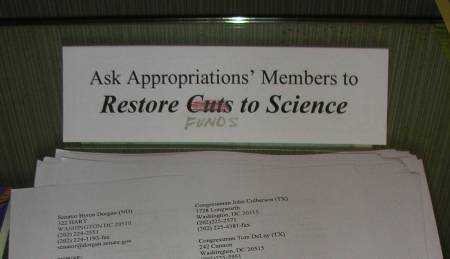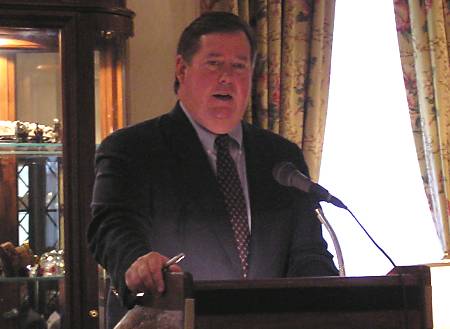By Jeff Foust on 2006 May 17 at 6:14 am ET That’s what NASA is facing with next month’s resignation of Rep. Tom DeLay (R-TX), according to the Capitol Hill newspaper The Hill. His departure “could bolster DeLay’s opponents on space exploration” and other matters, the article claims. That’s probably a bit of a stretch, since unlike other hot-button issues (or perhaps simply “unlike hot-button issues”, since space typically isn’t one) there isn’t an anti-space lobby per se in Congress, only members less willing to advocate for increased funding for NASA. (It’s rare for NASA to come up for a major floor debate in either the House or Senate in recent years, particularly since the retirement of space station opponents Rep. Tim Roemer and Sen. Dale Bumpers several years ago.)
Regardless, his influence will be missed by the space agency. The Hill reports that Rep. John Culberson (R-TX) will take over fighting for NASA funding in the House Appropriations Committee, but Culberson has only a fraction of the influence of DeLay. Another possibility is Rep. Ken Calvert, who currently chairs the space subcommittee of the House Science Committee, and could be tapped to take the vacancy on the appropriations committee created by DeLay’s departure; DeLay said that Calvert would “probably” be on the committee during his Space Transportation Association breakfast last week.
By Jeff Foust on 2006 May 16 at 6:28 am ET An article in this week’s issue of Space News (no subscription required) identifies the key problem NASA backers face in their efforts to add a billion or more dollars to NASA’s FY07 budget: the extra money is not in the overall budget allocation for the appropriations subcommittee that has jurisdiction over NASA. The article notes that the subcommittee found out earlier this month that they have $109 million more than previously planned to spend this year. However, the Science, State, Justice, and Commerce subcommittee has jurisdiction over a lot more than just NASA, which means plenty of competition for that additional money. And, even if NASA could snare all the additional funding, it would still fall far short of the authorized funding level for the agency in 2007, the goal that NASA supporters in Congress, and outside it, are aiming for.
By Jeff Foust on 2006 May 16 at 6:21 am ET That’s the cry of two leading Democrats on the House Science Committee, who announced Monday that they want the president to remove Conrad Lautenbacher as the administrator of NOAA. Full committee ranking member Bart Gordon (D-TN) and David Wu (D-OR), ranking member of the environment, technology, and standards subcommittee, said they want Lautenbacher and John J. Kelly Jr., the deputy administrator for oceans and atmosphere, removed because of the cost overruns and delays in the NPOESS satellite program. “Who is accountable for the billions of dollars cost due to gross mismanagement of this essential program? The buck stops at the feet of the Admiral and his deputy, the General,” said Gordon, referring to the ranks held by Lautenbacher and Kelly, respectively. “If the President fails to take action to refresh NOAA leadership and salvage this program, then the blame should rightly shift from the agency to the Oval Office.” While Republican members of the committee have not made similar calls, it’s clear from last week’s hearing that they’re also not exactly giving him a huge vote of confidence.
By Jeff Foust on 2006 May 15 at 5:52 am ET In this week’s issue of The Space Review Gregory Anderson has a short interview with former House Speaker (and potential 2008 presidential candidate) Newt Gingrich. Gingrich, as most readers know, has had a long interest in space, which is still the case in the interview, and has been a proponent of more activity by the private sector in space. Indeed, he is not terribly fond of NASA:
I am for a dramatic increase in our efforts to reach out into space, but I am for doing virtually all of it outside of NASA through prizes and tax incentives. NASA is an aging, unimaginative, bureaucracy committed to over-engineering and risk-avoidance which is actually diverting resources from the achievements we need and stifling the entrepreneurial and risk-taking spirit necessary to lead in space exploration.
Elsewhere in the interview, he advocates tax credits to provide incentives for space manufacturing and space transportation endeavors, as well as “very large prizes” for various projects: “If you had priced the space station as a purely private achievement and paid for it only upon completion you could probably have had three or four companies building systems in one-third to one-fifth of the time for the same total amount of money or less.”
By Jeff Foust on 2006 May 15 at 5:46 am ET Has the US entered a “new era of space diplomacy”? That’s the claim of an AP article that tried to tie together the recent US-India accord to fly NASA instruments on India’s Chandrayaan-1 lunar mission as well as plans for NASA administrator Mike Griffin to travel to China later this year. James Lewis of the Center for Strategic and International Studies tried to tie the India and China trips together:
“If he [Griffin] can go to China with agreements with other partners, like India, it doesn’t give the sense that we’re desperate,” Lewis said. “It’s not like we’re coming with bent knees to the Chinese.”
However, it’s not clear that NASA would be “desperate” in talking with the Chinese regardless of deals with India and other nations. While cooperation with China might be useful, from either a strategic and/or technical standpoint, it’s hardly essential in either case. A possibility that is more interesting—and not explored in the AP article—is whether these overtures to India and even China, as well as existing cooperation with Japan, might be the beginning of a larger, geopolitical shift that sees more cooperation with these nations at the expense of Europe and Russia.
By Jeff Foust on 2006 May 15 at 5:32 am ET The Wall Street Journal (subscription required) reports this morning that Boeing and the Justice Department have reached a settlement involving federal investigations of impropriety by the company, including its launch business. (For those who don’t have WSJ.com subscription, check the free Reuters and MarketWatch articles.) Under the agreement, Boeing would pay $615 million to close the investigations without officially admitting any wrongdoing. Part of the deal involves claims that Boeing used proprietary Lockheed Martin documents to prepare its own bid for EELV launch services back in the 1990s, a claim that triggered a separate Lockheed lawsuit against Boeing (one that would be settled if the United Launch Alliance wins approval.) It’s not clear how much effect this will have on the ULA, federal approval of which is being handled separately by the FTC. It would, though, make it harder for Lockheed to pursue its lawsuit against Boeing should the ULA fall through, since Boeing did not have to admit any guilt in its federal settlement.
By Jeff Foust on 2006 May 12 at 6:06 am ET  Ronald Reagan looks out over Tom DeLay—literally, at the very least—during DeLay’s speech Thursday morning. Rep. Tom DeLay, just weeks away from his retirement from the House, was the speaker at a Space Transportation Association breakfast Thursday morning. His comments were brief, and largely looked back on the accomplishments that he, the Bush Administration, and NASA have made in recent years. “When I leave Congress this summer, I will leave with the space program in a stronger position than it has enjoyed in years,” he said. He also touched upon the authorization bill for NASA that Congress passed last fall, and warned that, given competitive pressures from China in particular, that “we ensure we maintain our lead in the upcoming years.”
The highlight of the morning, though, might have been just before DeLay’s speech, when NASA deputy administrator Shana Dale presented him with a framed display of pins from all of NASA’s shuttle missions since 1981. DeLay could not contain his glee, muttering “wow, wow” several times, even as Dale continued to describe the gift. “That is really special, wow,” he said.
DeLay did offer one policy insight: he is skeptical that Congress will be able to fund NASA at the level authorized in last year’s legislation. “It’s going to be very difficult,” he said. “We’re taking this a little at a time.” His language was a little curious, though: “We’ll be working very, very hard to eke out as much as we can. This year and next year and the following years, we’re going to close that gap that we’re all interested in. We’re going to have to fight, claw for every dime that we can.” We? Is that an old habit or does he have plans once he leaves Congress to remain involved?
DeLay’s statement comes at the same time that Reps. Bart Gordon and Mark Udall, the ranking members of the House Science Committee and its space subcommittee, respectively, sent a letter to the chairman and ranking member of the House Appropriations Committee subcommittee that oversees NASA, asking for additional money for science and aeronautics programs. They ask specifically for $587.4 million in additional money, principally for science missions and aeronautics research (although they did request $8 million more for COTS to bring it up to the level specified in FY07 in the RFP.) “Fundamentally,” Gordon and Udall write, “we believe that it is important for Congress to provide an overall funding level for NASA as close as possible to the $17.8 billion level recommended by the NASA Authorization Act of 2005. Otherwise, as is demonstrated by NASA’s FY 2007 budget request, ill-advised and damaging cuts to NASA’s science and aeronautics programs, as well as to important long-term exploration research and technology efforts are inevitable.”
By Jeff Foust on 2006 May 12 at 5:34 am ET A major satellite project that’s over budget and behind schedule? That’s hardly news in Washington these days. Still, the problems associated with the National Polar-orbiting Operational Environmental Satellite System (NPOESS) warranted the attention given them during a hearing of the House Science Committee on Thursday. The hearing was coordinated with the release of a report by the Commerce Department’s Inspector General which criticized the management of the program. One issue was that an “executive committee”, or EXCOM, comprised of officials from the agencies involved or NPOESS failed to “effectively challenge” optimistic assessments about the status of a troubled instruments. Moreover, despite the continued problems with the program, the prime contractor, Northrop Grumman, was still receiving most of the possible incentive payments: 84 percent as of last fall, when the project notified Congress of a Nunn-McCurdy breach. (The Nunn-McCurdy review of the program is ongoing, and the committee plans another hearing next month once the review is complete.)
The release led to the expected amount of Congressional hand-wringing. “This program is in complete disarray,” said Bart Gordon (D-TN), ranking member of the full committee, said in a press release. He said he had sent a letter to the president asking him to “engage the White House in the Nunn-McCurdy process to guarantee that a broad perspective on our nation’s security is used by DOD in their review and certification process.” “So clearly, changes are desperately needed for NPOESS to succeed, and succeed it must,” Sherwood Boehlert (R-NY), chairman of the committee, said in opening statement. Vice Admiral Conrad Lautenbacher, administrator of NOAA, said that the program was being more tightly managed and that the agency was reconsidering the payment of incentive fees to Northrop. It’s hardly the last word you’ll hear about NPOESS, though.
By Jeff Foust on 2006 May 11 at 5:46 am ET On a table in the lobby of the Sheraton Gateway Hotel in Los Angeles during the International Space Development Conference last weekend, I saw a sign next to flyers that had contact information for members of the House and Senate appropriations committees:
So, when you restore cuts, do you add or take away money? It appears that someone wanted to avoid any ambiguity…
By Jeff Foust on 2006 May 11 at 5:45 am ET
Rep. Ken Calvert (R-CA), chairman of the space subcommittee of the House Science Committee, spoke at an STA breakfast a couple weeks ago about the NASA budget and related issues (I only got around to this now because of travel and other work, plus, there’s another STA breakfast with Tom DeLay scheduled for this morning to serve as a reminder.) He said he had just returned from recess in California, speaking with his constituents. “There wasn’t a lot of talk about space; a lot of talk about immigration, and a lot of talk about gas prices.” That was a major theme of his talk: that the American public has to be more aware of, and engaged in, NASA’s efforts. “It used to be the American public had very strong and vocal support for science and space. We need to bring to the members of Congress, because we’re a reactive body.”
That public support, he said, is essential in getting NASA an additional $1 billion or so for the FY2007 budget to offset some of the cutbacks made in science programs. He acknowledged that it’s odd for a fiscal conservative to advocate increased spending, but the problem “is not on the discretionary side of the budget: we need entitlement reform. Unfortunately, the discretionary side is paying the price, and that’s the future of this country. Where would we be today if we didn’t have a space program?”
Calvert did acknowledge that NASA is one of the few agencies that got any sort of budget increase in the FY07 proposal. “So the administration would say that NASA is lucky to get what it got,” he said. “They believe they’ve done whatever they can do from a budgetary process, so we have to do our job convincing the administration this is more important than that.”
|
|


